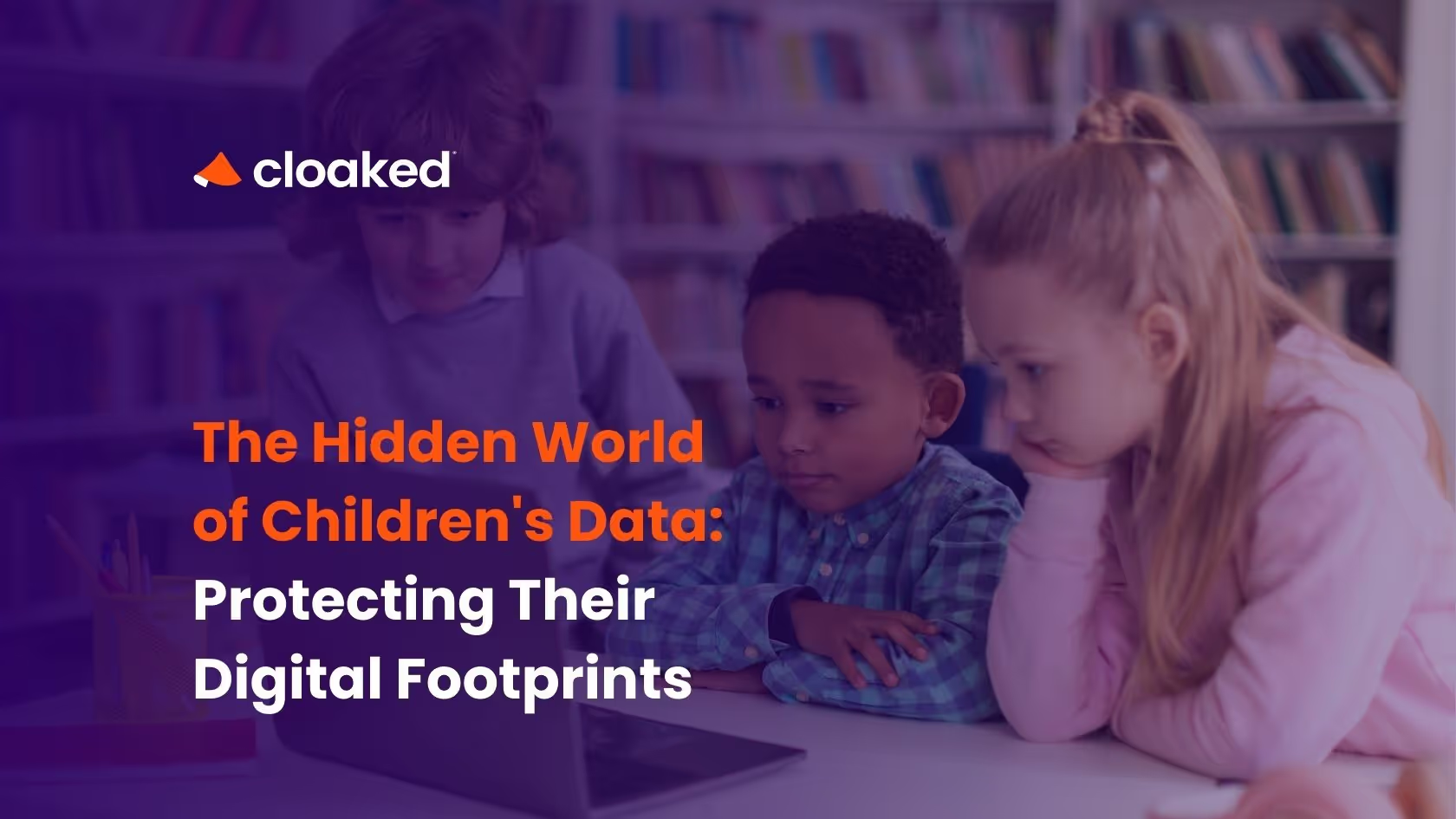Have you ever paused to consider what happens to the pictures, videos, and personal details you share about your children online? It's easy to get caught up in the joy of sharing precious moments with family and friends, but the internet never forgets. The hidden world of children's data is a labyrinth that every parent should navigate with caution.
The Dangers of Oversharing
Sharing those first steps, messy ice cream faces, and birthday party fun on social media might seem harmless at first glance. However, each post contributes to a digital trail that could potentially expose your children to risks. Identity theft, cyberbullying, and unwanted attention from strangers are just a few clicks away from innocent oversharing.
Each picture and detail shared adds to your child's digital footprint. It's like leaving tiny digital breadcrumbs online; only these can't be swept away. Here's a scenario to think about: a seemingly harmless post about your child's favorite park could inform a stranger exactly where to find them during leisure times. Scary, isn't it?
The key is understanding the impact of each post:
- Identity Theft: Personal information, like full names, birthdays, and even locations, can be pieced together by cybercriminals to steal identities.
- Cyberbullying: Sharing too much information can lead to bullying or harassment, as peers or even strangers might use this information against your child.
- Unwanted Attention: Details about your child can attract the wrong kind of attention from people with malicious intent.
In the age where every click and share counts, it's crucial to think twice before posting that adorable, yet potentially risky, photo of your little one. Remember, protecting your child's privacy starts with you.
Digital Footprints: Their Lifelong Impact
From the seemingly innocent upload of a toddler's birthday party to a teenager venting about a rough day at school, each action adds to this digital trail. But what does this mean for the future?
Impact on Personal Privacy
- Data Privacy: Every piece of data shared contributes to a profile that companies use to target ads and offers, potentially affecting personal privacy and security.
- Long-term Consequences: Information once put on the internet is tough to erase. A misjudged post can resurface years later, with significant repercussions.
Impact on Future Opportunities
- Job Prospects: Recruiters often do a preliminary internet search on candidates. A digital footprint filled with professionalism and positive interactions can be beneficial, whereas reckless posts might close doors.
- Educational Opportunities: Universities sometimes review an applicant's social media presence to gauge their character and suitability for scholarships or leadership roles.
Guiding the Next Generation
It's crucial for parents and educators to guide children about the potential long-term effects of their online activities. Teaching kids to curate a positive online presence and understand privacy settings can help them build a beneficial digital footprint.
At Cloaked, we understand the significance of managing digital footprints effectively. Our innovative tools help individuals control their online presence, ensuring their data trails don't lead to unexpected outcomes. By using Cloaked's services, users can better manage what personal information is out there, request for deletion of data, and create virtual identities to prevent exposing your child's personal information - helping to secure both their current and future digital identity.
Remember, every digital interaction shapes how the world sees you and possibly, more importantly, how you see yourself. Managing your digital footprint isn't just about privacy; it's about crafting a narrative of who you are and who you aspire to be.
Data Brokers and Your Child's Information
Imagine a world where every little detail about your child, from their favorite ice cream flavor to the school they attend, could be packaged and sold without your consent. This isn't a scene from a sci-fi movie; it's what happens in the shadows of the digital age with data brokers. These entities collect, compile, and sell personal information, including that of minors, often without explicit consent. Here's why and how you should be concerned:
Understanding Data Brokers
Data brokers are companies that gather personal information from various sources, including public records, online activities, and purchases. They create detailed profiles that are sold to advertisers, marketers, and other businesses. Here's the kicker: this data collection often includes children's information, which is particularly valuable because of their developing brand loyalties and influence over family spending.
The Value of Your Child's Information
- Marketing Goldmine: Children influence over $500 billion in family spending annually in the U.S. alone. Marketers use data to craft targeted ads, directly appealing to kids and indirectly through parental influence.
- Long-term Tracking: By starting young, data brokers can track preferences and behaviors over time, creating highly predictive models of future behavior.
Protecting Your Child's Digital Footprint
In a world teeming with data-hungry sharks, how do you safeguard your child's digital presence? Here are some actionable steps:
- Check Privacy Settings: Regularly review privacy settings on all devices and apps used by your child. Opt out of data sharing when possible.
- Educate Your Child: Teach them about the importance of privacy online. Encourage them to share minimal personal information.
- Use Privacy-focused Tools: Consider tools that help mask or control the data shared online. For instance, Cloaked offers solutions designed to protect personal information by providing alternate, proxy contact details that shield your child's real information.
By understanding the role of data brokers and taking proactive steps to protect your child's information, you can help secure their present and future digital identity. It's not just about shielding them from ads; it's about preserving their right to privacy and letting them shape their own digital narratives. In this digital playground, let's play it safe and smart!
The Cost of Free Apps and Games
Ever downloaded a free app and wondered how it's actually free? Well, let's pull back the curtain on this modern-day digital magic trick. Often, the true cost of free apps and games isn't something you pay with money but with something potentially more valuable: your personal data.
Why Free Isn't Always Free
At the heart of many "free" apps and games lies a trade-off -- your privacy for their service. These apps make their revenue in a few ways, but one of the most prevalent is through advertising. To make those ads effective (and profitable), companies need data to target users precisely. Here's what typically happens:
- Data Collection: Free apps often require permissions to access areas of your device that may seem unrelated to the functionality of the app itself. Ever wondered why a simple game needs access to your contact list or location? Well, it's likely using that info to understand more about you.
- Data Sharing: Once collected, your data might be shared with or sold to third parties, expanding the network of entities that know about your habits, preferences, and behaviors.
Risks to Your Privacy
By downloading and using free apps, you could be exposing yourself to several risks, such as:
- Identity Theft: If sensitive information like your full name, address, or date of birth is mishandled, it could fall into the wrong hands.
- Behavioral Tracking: Information about your app usage, location, and even browsing history can be used to build a detailed profile of your habits and interests.
Being Mindful About Permissions
Here's a tip: always check the permissions that an app requests before downloading it. If an app asks for more permissions than it needs to function, think twice about installing it. Here's where a product like Cloaked can be a lifesaver. It offers solutions that allows you to create aliases that you can share instead of your personal information with tools that are easy to use, ensuring that you can enjoy free apps without compromising your privacy.
- Selective Sharing: With Cloaked, you can limit personal information that you share with apps by creating online virtual identities.
Remember, the next time you download a free app, take a moment to consider what you're really trading for that free service. Sometimes, the cost of free isn't worth the risk to your personal data. Always stay informed and cautious about the permissions you grant. Your privacy deserves that vigilance!
Steps to Safeguard Your Child's Online Privacy
In the digital playground of today's world, safeguarding your child's online privacy can sometimes feel like a game of digital hide-and-seek. Here, I'll walk you through some practical steps to help you win this game, ensuring your child's digital footprint is as safe and secure as possible.
Review and Update Privacy Settings on Social Media and Apps
First off, let's tackle the privacy settings. It's like checking the locks on the doors in your digital home. Social media platforms and apps are constantly updating their features, which can sometimes change your privacy settings without you noticing. So, what can you do?
- Regular Check-ups: Make it a habit to check privacy settings every few months or after an app update.
- Limitations: Set profiles to private and limit who can see your child's posts and personal information.
- Location Services: Disable location sharing to keep your child's whereabouts private.
Educate Your Child About Not Sharing Personal Information Online
Next up, it's crucial to chat with your kids about the digital trails they leave. It's a lot like teaching them not to talk to strangers at the park.
- Personal Info: Explain why they should keep details like their full name, address, school, and birthday private.
- Passwords: Teach them the importance of creating strong passwords and keeping them secret, even from friends.
- Think Before You Click: Encourage them to think critically about what they share and who they share it with.
Use Tools Like Cloaked to Manage and Safeguard Online Presence
To add an extra layer of protection, consider using tools designed to protect online privacy. Cloaked, for instance, offers innovative solutions that help mask your child's email and phone number on the web, creating barriers against data breaches and identity theft.
- Email Aliases: Cloaked provides unique email aliases that can be used in place of your child's real email, keeping their actual details secure.
- Phone Security: It also allows the use of virtual phone numbers, which can protect your child's actual phone number from being exposed online.
Be Mindful of What You Share About Your Child Online
Finally, as parents, it's also vital to reflect on our own sharing habits. Each photo or post we share about our kids can contribute to their digital footprint.
- Think Privacy: Share with privacy in mind. Adjust settings to limit the audience or opt for sharing in more private groups.
- Consent: As they grow, include your child in the decision-making process about what is shared about them online.
By taking these steps, you can significantly enhance the safety of your child's online presence. Remember, it's about making small, consistent efforts to protect their digital playground.










